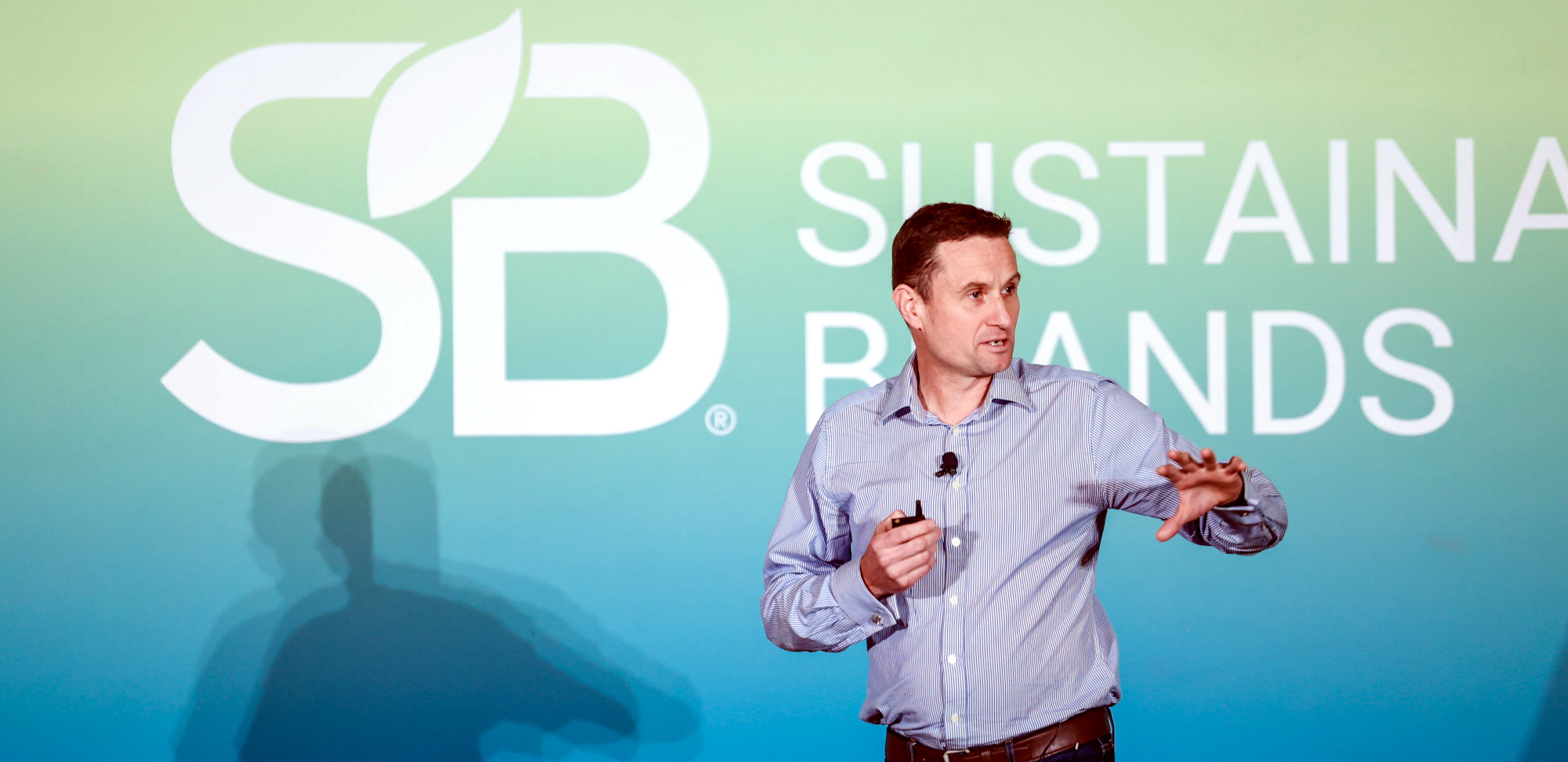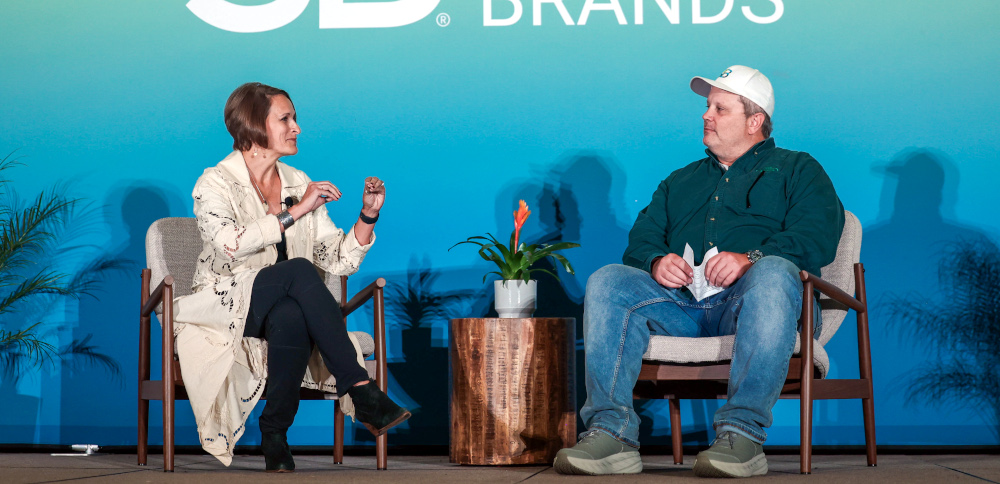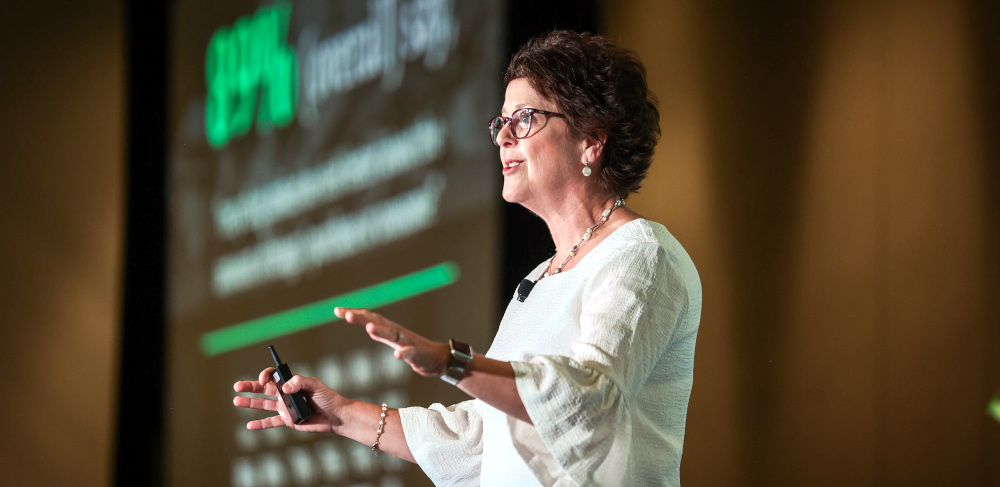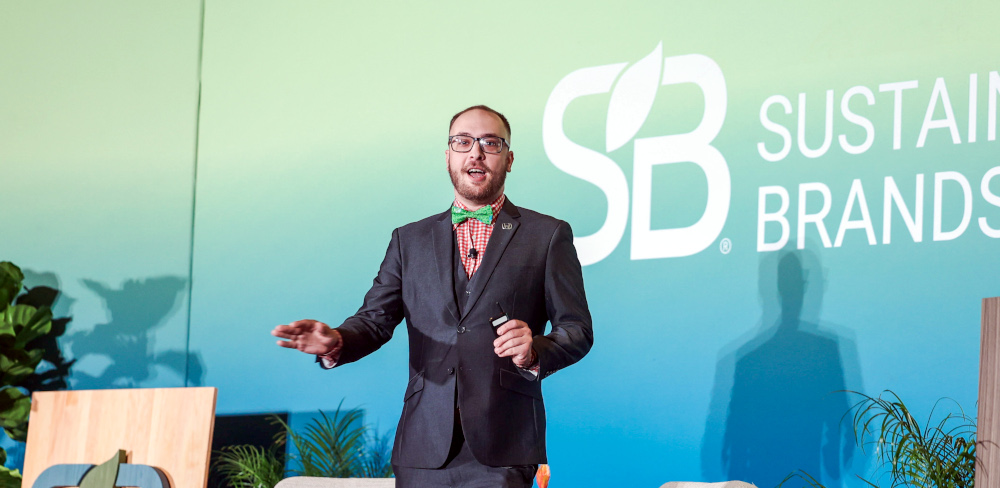There was good reason for Mike
Dupee to quote John Mayer and
deliver a heartwarming story about coaching his son’s little league baseball
team — the Sustainable Brands® CEO was reminding delegates here at SB’24
San Diego
to maintain hope as we work to make it easy for consumers to live more
sustainably.
‘Value management’ — an essential capacity for enhancing system health
 Adam Lusby
Adam Lusby
Regenovate co-founder Adam
Lusby backed up his message with a
rousing call for a serious shake-up of current business models. Quick to get the
doom and gloom out the way (“We’re running a deficit economy. We’re on track to
go way beyond 2°C. In my lifetime, biodiversity is in a deficit of 70
percent. One in five Americans is suffering from mental illness. We’re more
disconnected from nature than ever before”), the strategist keenly pointed
delegates in a different direction.
“Children do something wonderful: They suspend disbelief. They find connections
where we don’t see them. I want you all to embrace your inner five-year-old, to
find new connections and suspend disbelief,” he said.
The connections he wants business to make are those that link the value a
business can create with the dividends and resilience that come to an
organization from enhancing system health. If “financial capital drives
degeneration,” it is time for brands to focus on all other forms of capital —
including social, natural and manufactured. These capital stocks can combine to
create a flow of value, and create what Lusby describes as a “surplus economy —
a spillover of value.”
Keurig Dr Pepper: ‘Strategic patience’ key to effectively cracking circularity
 Monique Oxender and Mike Dupee
Monique Oxender and Mike Dupee
Creating an effective, consumer-friendly and sustainable way to provide
single-serve coffee has been a 20-year journey for Keurig Dr
Pepper. But as Chief Corporate Affairs Officer
Monique Oxender shared with Dupee
during their onstage discussion, her team finally cracked it — after investing
heavily in improving recyclability and moving to polypropylene to make it easier
for consumers to dispose of their coffee pods responsibly, the result is a
plastic-free and aluminum-free coffee pod with a plant-based coating. It’s
called the
K-Round,
and Oxender is excited about it.
“The thing is, consumers want more than sustainability,” she said. “They want
quality, they want variety, and they want value. That’s the unlock — creating
something that meets a consumer need.”
After experimenting with paper-based pods (which left a “mushy mess”), they
arrived at the polypropylene pod. The trouble was, it demanded that consumers go
out and buy a new machine.
“There wasn’t enough packed into that machine to encourage them to upgrade. They
weren’t going to do it simply in the name of sustainability,” Oxender said.
What enabled the company to finally succeed? She put it down to being given the
time and space to develop the result without pressure or criticism from within
the business. Oh, and they also nailed the plant-based coating element by
teaming up with a Swiss company that had already successfully deployed it. In
partnership, they agreed to license the technology in North America — and voila.
“Consumers do not just want sustainability. They are less and less willing
to make compromises. And they also want other things from coffee — they want it
smaller, they want it colder … What excites me most is that our efforts to
create the K-Round are not just about finding a plastic- and aluminum-free
option. It’s been about meeting other consumer demands, too — not just pushing
them, but pulling them.”
Oxender concluded by reminding the audience that solutions take time — in this
case, 20 years: “You need strategic patience.”
First rule of circularity: Don’t talk about circularity (and other tips from SB’s ‘awesome’ new playbook)
 Suzanne Shelton
Suzanne Shelton
Suzanne Shelton, founder of
Shelton Group and Senior Partner at
ERM, then introduced the fruits of SB’s Go Circular
Collaborative
— a working group of select SB Member brands that has been working to co-create
a playbook to help brands drive awareness and adoption of circular products and
services.
The resulting playbook, which will soon be made available to SB Members, is
largely based on Shelton’s experience and understanding of current “mental
models.”
“The good news, when it comes to driving a circular economy, is that most people
— 75 percent of them — want to be eco-friendly,” she said. “44 percent of people
can even cough up examples unaided of when they have purchased, or not, from a
brand because of their environmental or social record.”
The other good thing is that the large majority (97 percent) think recycling
helps the
environment:
“For the last 40 years, we’ve been told: Be ‘green,’ recycle. 89 percent of
people say that
recycling
makes them feel better.”
Shelton argues that because of this current “mental model,” brands don’t need to
go much further to start talking about circularity — they just shouldn’t use
that word, she said.
“It’s a mental model we have created, but we need to expand the model — and we
do need different words.” In a situation where more people are concerned about
plastics in the
ocean
than they are about climate
change
or
biodiversity
(according to Shelton’s research),
“reuse”
and “reduce” are words we can lean into.
“Go check out the playbook, y’all. It’s an awesome tool,” she added. Alongside
the 10 principles for how brands should communicate and engage on circularity,
there are lots of examples — with tips on words and images that companies should
and shouldn’t use.
“Crucially, brands need to work together. No one company should be on the hook
for trying to move consumers to adopt circular products and services.
Collaboration is key.”
Honda wants to use hydrogen to rid the world of diesel
 David Perzynski
David Perzynski
David
Perzynski
is incredibly proud to work at Honda. He is Assistant
Manager for the company’s Hydrogen Solutions Business Development — and as
the auto giant races towards being a zero-carbon business, he is excited to be
working in a sector that can make a huge difference.
Honda’s fuel cell vehicles and technology story are on full display around the
conference venue this week, and at the heart of the company’s efforts to have
zero environmental impact (and zero traffic fatalities) by 2050. And there is
plenty driving Honda’s engineers to scale up the adoption of hydrogen-powered
cars and trucks — not least, founder Soichiro
Honda’s original
vision that “the purpose of technology is to help people.”
Perzynski reminded the audience of how Honda responded to stringent local air
emissions regulations during the 1970s, something that many companies thought
impossible to achieve.
“Our engineers said, ‘We can do this. We must do this.’ It wasn’t about
complying; it was about leaving a better world for our children. And it was a
rallying cry that inspired our workers.”
The automaker is responding to a similar rallying cry to make its zero-emissions
technology as attractive as possible to consumers and brands. The Class 8
hydrogen fuel cell
truck
on display in the SB Innovation Zone can drive 400 miles with no emissions.
Honda’s hydrogen fuel cell tech is not new (the company has been doing it for 40
years); but in creating hybrid vehicles and promoting the use of clean energy
storage, it hopes to find many new markets in the coming years.
“Please work with us to get rid of diesel; think of the impact we can make
together,” Perzynski added.
Get the latest insights, trends, and innovations to help position yourself at the forefront of sustainable business leadership—delivered straight to your inbox.
Tom is founder of storytelling strategy firm Narrative Matters — which helps organizations develop content that truly engages audiences around issues of global social, environmental and economic importance. He also provides strategic editorial insight and support to help organisations – from large corporates, to NGOs – build content strategies that focus on editorial that is accessible, shareable, intelligent and conversation-driving.
Published Oct 16, 2024 2pm EDT / 11am PDT / 7pm BST / 8pm CEST